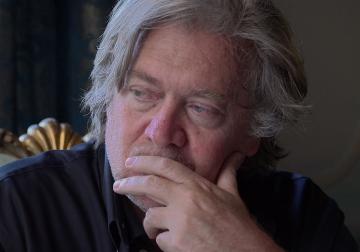‘The Brink’ depicts Trump strategist Bannon in the raw
The emperor’s new clothes were expertly tailored by Steve Bannon, whose own outfits looked like they came from the Goodwill store. When he took over Donald Trump’s presidential campaign, “Sloppy Steve” — as the president later dubbed him — says his goal was to lose 35 pounds and shed his image as a “gross-looking Jabba the Hutt.”
It’s one of several almost-endearing moments to be found in “The Brink,” Alison Klayman’s revealing documentary portrait of the man who did the impossible, delivering his candidate and his far-right ideology into the Oval Office.
But be careful what you wish for, or engineer: Once ensconced in the West Wing, Bannon finds it full of “bad karma” and “hated every second” he was there. Shortly after the Charlottesville “Unite the Right” rally in August 2017, he resigns as White House chief strategist.
From that point forward, he is free to freelance as a kingmaker. “The Brink” follows him domestically first, in the fall 2017, as he’s vetting candidates in search of the most Trump-like ones “to fight the elites and the establishment.”
- Starring: Steve Bannon, Erik Prince, Nigel Farage.
- Rating: Not rated but R in nature for language and subject matter.
The first one he publicly supports is the now-infamous Judge Roy Moore. One of the film’s finest moments is a Bannon speech in Alabama, interrupted by a loud female heckler who is instantly ousted.
“I want to thank one of my ex-wives for showing up,” Bannon deadpans. “I thought my lawyer sent that check.”
He is, after all, a fairly witty and rather charming guy, especially compared to Donald Trump. The unruly hair, the splotchy complexion, the frumpiness — the reflective speech and calm voice — are all very different from the tweezed Sean Hannity model. Bannon actually listens to his interlocutors, doesn’t interrupt or bully them, doesn’t swear, and — above all — has a self-deprecating sense of humor.
He’s also smart as a whip: “The left has never figured out how to do talk radio — it’s such a powerful weapon for the right.”
And he’s nothing if not resilient. He’s an ex-Goldman Sachs banker who reinvents himself as the herald of a global populist movement in which he’s not the Messiah but John the Baptist, mobilizing the far-right parties in the 2019 European parliamentary elections.
“I’m on a mission for economic nationalism,” he declares. “Brexit and [Trump’s election in] 2016 are inextricably linked.”
With Marine Le Pen in France, Viktor Orban in Hungary, and their counterparts in Poland and Italy, we see him working to exploit anti-immigrant resentment and nativist xenophobia and the “threat to Christian culture” throughout Europe.
“Hate and anger are motivators.”
Divisiveness and polarization? Bring it on.
“You don’t have to convince everybody, you don’t even need a majority,” he says, “just a solid-enough minority, say 20% or so, to take over the government and then deconstruct the existing state.”
Director Klayman’s debut feature, “Ai Weiwei: Never Sorry,” about the Chinese artist and activist, won the 2012 Sundance Film Festival’s Special Jury Prize. This one is equally well-crafted cinema verité — equally engaging and enraging. Its highlights include a “South shall rise again” type fundraiser — the Citadel, S.C., Republican Society Patriot Dinner — with outdoor fiddlers playing pretty much the same music heard at Tara in “Gone With the Wind.”
Ms. Klayman occasionally asks Bannon a question, but mostly lets her unobtrusive camera record him and friends like Erik “Blackwater” Prince without interjection. Not a single Democratic — or any other — critic is inserted “for balance.” She lets “Trump’s Rasputin” reveal himself and his cynical worldview in the raw.
But not least of his redeeming qualities is that he called the Donald Trump Jr. Tower meeting with the Russians “treasonous and unpatriotic” and carries around a copy of Carl Sandburg’s “Lincoln,” quoting freely therefrom. After his West Wing departure, he was also fired by Breitbart, his radio show and his funders, prompting Trump’s tweet (Jan. 5, 2018): “...Now Sloppy Steve has been dumped like a dog by almost everyone. Too bad!”
The 64-year-old Bannon doesn’t seem to take it personally. He relishes both his real and his fantasy historical roles.
“I’m doing the Lord’s work,” he says here.
Serious or mocking? Hard to say. He blesses himself in the Catholic fashion at grace.
“If I hadn’t come into the campaign, Trump wouldn’t have won. … It was divine providence that delivered that.”
Wait a minute. Which was it, Bannon or God?
Opens Friday at the Regent Square Theater.
Post-Gazette film critic emeritus Barry Paris: parispg48@aol.com.







